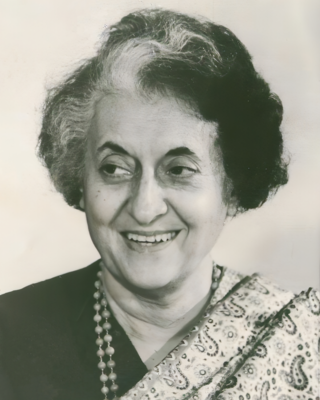
Indira Priyadarshini Gandhi was an Indian politician and stateswoman who served as the Prime Minister of India from 1966 to 1977 and again from 1980 until her assassination in 1984. She was India's first and, to date, only female prime minister, and a central figure in Indian politics as the leader of the Indian National Congress (INC). She was the daughter of Jawaharlal Nehru, the first prime minister of India, and the mother of Rajiv Gandhi, who succeeded her in office as the country's sixth prime minister. Gandhi's cumulative tenure of 15 years and 350 days makes her the second-longest-serving Indian prime minister after her father. Henry Kissinger described her as an "Iron Lady", a nickname that became associated with her tough personality.

The prime minister of India is the head of government of the Republic of India. Executive authority is vested in the prime minister and his chosen Council of Ministers, despite the president of India being the nominal head of the executive. The prime minister has to be a member of one of the houses of bicameral Parliament of India, alongside heading the respective house. The prime minister and his cabinet are at all times responsible to the Lok Sabha.

The Indian National Congress (INC), colloquially the Congress Party or simply the Congress, is a political party in India with deep roots in most regions of India. Founded on 28 December 1885, it was the first modern nationalist movement to emerge in the British Empire in Asia and Africa. From the late 19th century, and especially after 1920, under the leadership of Mahatma Gandhi, the Congress became the principal leader of the Indian independence movement. The Congress led India to independence from the United Kingdom, and significantly influenced other anti-colonial nationalist movements in the British Empire.

First Lady or First Gentleman is an unofficial title usually used for the spouse, and occasionally used for the offspring or other relative, of a non-monarchical head of state or chief executive. The term is also used to describe a person seen to be at the top of her profession or art.

Feroze Jehangir Gandhi was an Indian freedom fighter, politician and journalist. He served as a member of the provincial parliament between 1950 and 1952, and later a member of the Lok Sabha, the Lower house of Indian parliament. He published The National Herald and The Navjivan newspapers. His wife, Indira Gandhi, and their elder son Rajiv Gandhi were both prime ministers of India. He was a member of Indian National Congress.

Morarji Ranchhodji Desai was an Indian independence activist and politician who served as the Prime Minister of India between 1977 and 1979 leading the government formed by the Janata Party. During his long career in politics, he held many important posts in government such as Chief Minister of Bombay State, Home Minister, Finance Minister and 2nd Deputy Prime Minister of India.
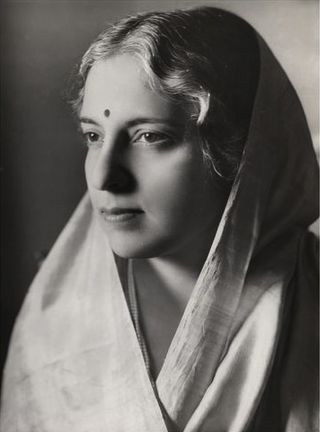
Vijay Lakshmi Pandit was an Indian freedom fighter, diplomat and politician. She served as the 8th President of the United Nations General Assembly from 1953 to 1954, the first woman and the only Indian to have been appointed to this post. She was also the 3rd Governor of Maharashtra from 1962 to 1964. Noted for her participation in the Indian independence movement, she was jailed several times during the movement.

Kamala Nehru was an Indian independence activist and the wife of Jawaharlal Nehru, the first prime minister of India. Their daughter Indira Gandhi would go on to become the first and to date, the only female Prime Minister of India.
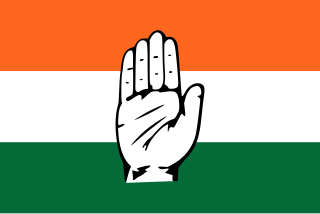
The Indian National Congress was established when 72 representatives from all over the country met at Bombay in 1885. Prominent delegates included Dadabhai Naoroji, Surendranath Banerjee, Badruddin Tyabji, Pherozeshah Mehta, W. C. Banerjee, S. Ramaswami Mudaliar, S. Subramania Iyer, and Romesh Chunder Dutt. The Englishman Allan Octavian Hume, a former British civil servant, was one of the founding members of the Indian National Congress.

The first lady or first gentleman of the Philippines is the courtesy title given to the host or hostess of Malacañang Palace, the residence of the head of state and head of government of the Philippines.
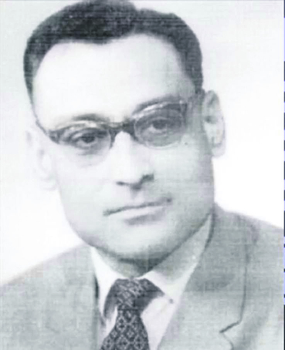
Rameshwar Nath Kao was an Indian spymaster and the first chief of India's external intelligence agency, the Research and Analysis Wing (R&AW) from its founding in 1968 to 1977. Kao was one of India's foremost intelligence officers, and helped build R&AW.

Vidya Charan Shukla was an Indian politician whose political career spanned six decades. He was predominantly a member of the Indian National Congress, but also had spells in Jan Morcha, Janata Dal, Samajwadi Janata Party (Rashtriya), Nationalist Congress Party and Bharatiya Janata Party. He was known as a close associate of Indira Gandhi.

Pupul Jayakar was an Indian cultural activist and writer, best known for her work on the revival of traditional and village arts, handlooms, and handicrafts in post-independence India. According to The New York Times, she was known as "India's 'czarina of culture'", and founded arts festivals that promoted Indian arts in France, Japan, and the United States. She was a friend and biographer to both the Nehru-Gandhi family and J Krishnamurti. Jayakar had a close relationship with three prime ministers: Jawaharlal Nehru, his daughter Indira Gandhi and her son Rajiv Gandhi, and she was a close friend of Indira Gandhi. She served as cultural adviser to the latter two, confirming her preeminence in cultural matters.

The Nehru–Gandhi family is an Indian political family that has occupied a prominent place in the politics of India. The involvement of the family has traditionally revolved around the Indian National Congress, as various members have traditionally led the party. Three members of the family—Jawaharlal Nehru, Indira Gandhi and Rajiv Gandhi—have served as the prime minister of India, while several others have been members of parliament (MP).
Tella Lakshmi Kantamma was an influential Indian politician who served as a member of parliament from 1962 to 1977. She was also a political advisor to Prime Minister P.V Narasimha Rao.
First Lady of India or First Gentleman of India is the title given to the host of the Rashtrapati Bhavan, usually the spouse of the president of India. There are no official roles or duties assigned to the spouse. The spouse generally attends official ceremonies and functions.
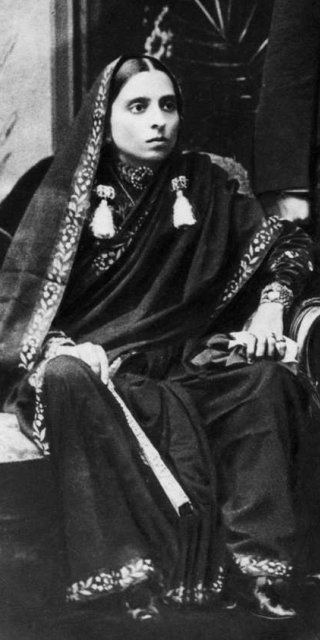
Swarup Rani Nehru was an Indian independence activist. She was the wife of barrister and Indian National Congress leader Motilal Nehru and the mother of India's first Prime Minister, Jawaharlal Nehru.

Shobha Nehru, commonly known as Fori Nehru and Auntie Fori, was a Hungarian-born Indian social worker and the wife of the Indian civil servant Braj Kumar Nehru of the Nehru family.






















